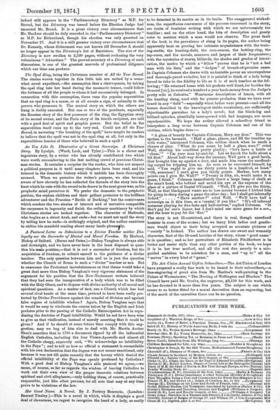A Pastoral Letter on Submission to a Divine Teacher neither
Dis- loyalty nor the Surrender of Mental and Moral Freedom. By Herbert, Bishop of Salford. (Burns and Oates.)—Bishop Vaughan is always able and downright, and we have never been in the least disposed to ques- tion his main position,—that it is not a surrender of freedom, but the acquisition of freedom, to submit oneself to the guidance of a divine teacher. The only question between him and us is just the question whether the Church of Rome is such a "divine" teacher or not. But to overcome the Protestant incredulousness on that theme would take a great deal more than Bishop Vaughan's very vigorous statement of the argument for his position that the New-Testament writers believed that they had seen the inauguration of a body which was to be filled with the Holy Ghost, and to dispose with divine authority of all moral and spiritual questions. As a matter of fact, can a Church which has had several rival heads at the same time, pretend to have been really pro- tected by Divine Providence against the scandal of division and against false organs of infallible wisdom ? Again, Bishop Vaughan says that it would be easy to vindicate the course taken by the English and Irish prelates prior to the passing of the Catholic Emancipation Act in repu- diating the doctrine of Papal infallibility. Would he not have been wise to give us that vindication, instead of merely asserting that it could be given ? And if he should at some future time comply with this sug- gestion, may we beg of him also to deal with Mr. Martin Archer Shee's assertion that in 1788 a document signed by all the influential English Catholics, including the four Vicars-Apostolic and almost all the Catholic clergy, expressly said, " We acknowledge no infallibility in the Pope"; and to tell us how so official a statement is reconcilable with his own declaration that the dogma was not sooner sanctioned, only because it was not till quite recently that the heresy which denied the official infallibility of the Pope was openly professed by Catholics ? With a good deal of Bishop Vaughan's able pastoral we agree,—we mean, of coarse, so far as regards the wisdom of leaving Catholics to work out their own view of the proper theoretic relations between spiritual and civil allegiance,—only holding them, of course, practically responsible, just like other persons, for all acts that may at any time prove to be violations of the law.






































 Previous page
Previous page